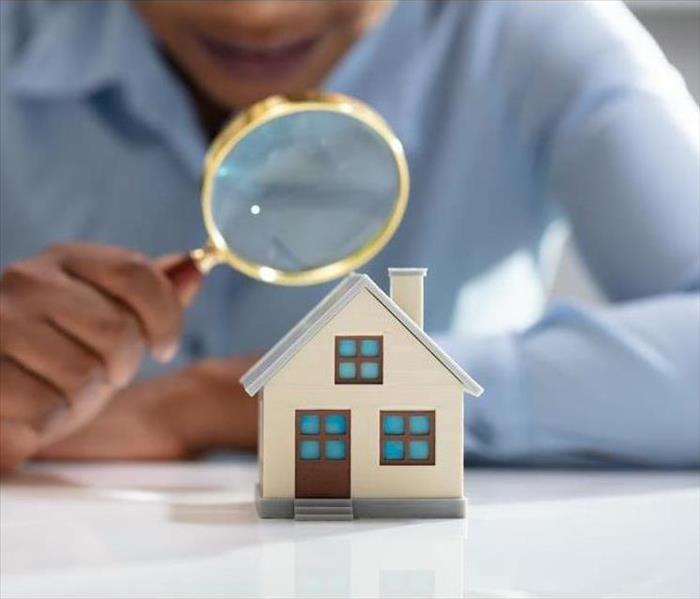Home Inspections: What Are They, When to Conduct One, and Why They’re Important
6/29/2021 (Permalink)
 Home inspections allow future homeowners and property managers to get a better feel for what areas of the home need to be replaced.
Home inspections allow future homeowners and property managers to get a better feel for what areas of the home need to be replaced.
A home inspection is a non-invasive, thorough examination conducted by professionals to get a better understanding of the current condition of the home. There are a few reasons why someone may have an inspection done. For instance, rental property managers may choose to conduct them quarterly and/or upon a tenant moving out. Others, like future home buyers, may choose to have them done before buying a home.
What Happens During a Home Inspection?
The inspection process will vary based on what type of inspection is being conducted. For example, if the inspector is there to look over the condition of the home after a tenant has moved out, they will look for structural damage, hazards, and/or defects.
In addition to the above, home buyer’s inspectors will also take a thorough look at the interior and exterior of the home to ensure it is up to code with local standards. If upon inspection they find anything that is not up to code, damaged, or that may need repairing, they must then report it to the buyer.
It is important to note that it is not the inspector’s duty to repair any damage found in or around the home. Instead, they are only there to make a record of the home’s current condition — it is up to the landlord or home buyer to decide how they want to approach making any necessary repairs.
How to Find a Home Inspector
Just as with hiring any contractor, you will want to be sure to look for a trustworthy home inspector with a good reputation. However, this can be difficult, especially since it’s hard to tell someone’s skill-level just by looking at them. Luckily there are tips to follow to help ensure you hire a reputable house inspector:
- Just because your real estate agent referred you to someone doesn't mean they’re the best. Do your research on the inspector before hiring them;
- Reach out to trusted family and friends who have recently purchased a home to see who they recommend;
- Check their credentials and see who is certified by a professional organization;
- Look at reviews online;
- Look for someone who has many years of training under their belt.
Finding an inspector with little to no experience — or failing to hire an inspector at all — may cost you more in damage repair in the long run.
What Do Home Inspectors Look for?
There are numerous parts of the home that an inspector will look at, regardless of the job’s purpose. This includes the:
- Attic;
- Basement;
- Ceilings;
- Doors;
- Electrical systems;
- Flooring;
- Foundation;
- HVAC systems;
- Interior plumbing;
- Landscaping;
- Major appliances;
- Roof;
- Structural components;
- Walls;
- Windows.
When observing these different spaces, the inspector will make note of any damage that is done to report back to the homeowner and/or property manager.
What Isn’t Looked for During a Home Inspection?
It may seem like housing inspectors look at everything from front to back. However, there are a few things that are out of their area of expertise. For example, inspectors will not look for:
- Asbestos;
- Lead paint;
- Mold;
- Pest damage.
If there are any signs of these in your home, you should call a professional that specializes in mold remediation, pest control, and asbestos removal. If there are signs of mold or asbestos, you may want to consider finding temporary housing — for these can be harmful to be around.
How Much Do Home Inspections Cost?
The average cost of a home inspection ranges between $300 and $500. However, the pricing is subject to change depending on multiple factors. Some factors to consider when budgeting for a home inspection include:
- The size of your home;
- What the inspection is for;
- What you want to be inspected;
- When your home was built;
- Where you live.
If anything, you can get a quote from a local inspection company to help you prepare for the cost of the inspection — keeping in mind the tips listed above when finding a local company to reach out to.
What Happens After the Home Inspection?
Depending on what the inspector finds, the homeowner/property manager may want to consider making a few changes to their home. For example, if they find signs of water damage — dark/wet spots, cracking in the walls, sounds of running water — they may want to consider looking into water damage restoration services.
Black soot and/or lingering smells of smoke could be an indicator that the home was once damaged by smoke or fire. This may require restoration services that specialize in fire and smoke.
If the home was previously damaged by flooding or storms, like visible water infiltration, broken gutters, water stains, wall cracks, cracked molding, and even crooked doors, then hiring a professional that specializes in flooding restoration services may be worth looking into.
Other potential restoration projects would include replacing the electrical and plumbing, installing new flooring, updating the HVAC system, or even pouring new cement in the basement.
Housing inspections are an important part of the house buying process. Without them, homeowners and property managers alike may be surprised with damages down the road that should’ve been caught earlier on. Regardless of why you need to hire an inspector, just know that it’s worth the initial cost and can save you money in the long run.




 24/7 Emergency Service
24/7 Emergency Service